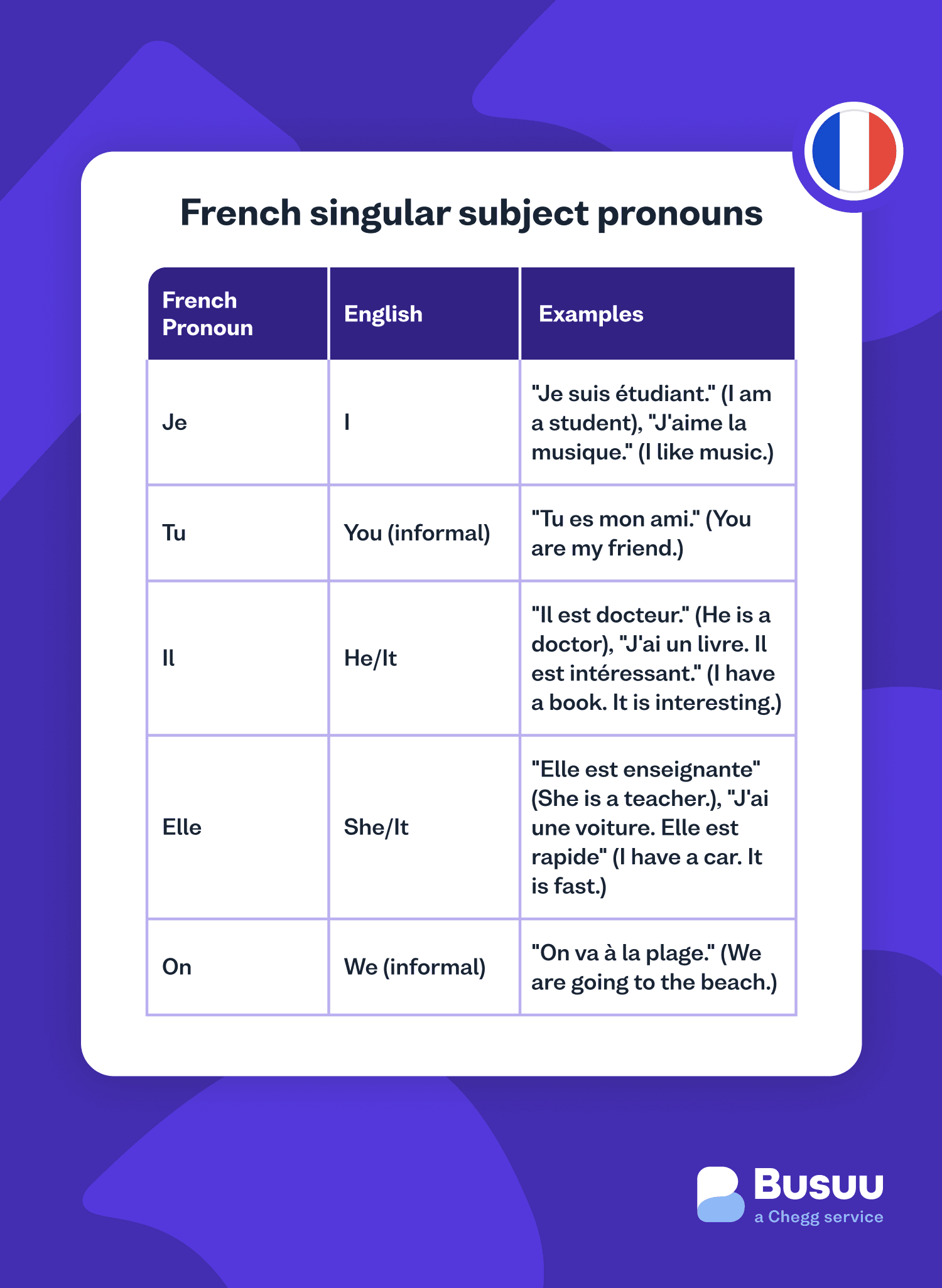I want to learn...
Subject pronouns are the most frequently used type of pronoun in French. They replace the noun as the subject of the sentence. French subject pronouns are used before a verb to show who or what is performing the action of that verb.
In this article, we will discuss more about the different subject pronouns in French, when and how we use them in formal and informal situations, plus get to learn some sample sentences with subject pronouns to guide you.
Let’s put all this into perspective and start!
Subject pronouns in French
In general, French subject pronouns can be compared with the same types of pronouns in English. Let’s see how that would go:
Je - I
"Je" is the French equivalent of "I" in English. It is always used in the first person. It changes to "j'" before a vowel or a silent h to make pronunciation in French easier.
Tu - You (informal)
"Tu" is the informal "you" in French. It is used in casual conversations amongst friends, family, and peers. You use "tu" when addressing someone whom you're familiar with.
Il - He / It (when replacing masculine singular noun)
"Il" means "he" or "it" and is used to replace a masculine singular noun. When it replaces an object, the choice between "il" and "elle" is determined by the gender of the noun it is replacing.
Elle - She / It (when replacing feminine singular noun)
"Elle" means "she" or "it." Similar to "il," "elle" is used to replace a feminine singular noun.
On - One / We / They (informal)
"On" is often used in casual conversation to mean "we," and is used frequently in French to replace "nous" in informal speech.

Singular subject pronouns
| French Pronoun | English | Examples |
|---|---|---|
| Je | I | "Je suis étudiant." (I am a student), "J'aime la musique." (I like music.) |
| Tu | You (informal) | "Tu es mon ami." (You are my friend.) |
| Il | He/It | "Il est docteur." (He is a doctor), "J'ai un livre. Il est intéressant." (I have a book. It is interesting.) |
| Elle | She/It | "Elle est enseignante" (She is a teacher.), "J'ai une voiture. Elle est rapide" (I have a car. It is fast.) |
| On | We (informal) | "On va à la plage." (We are going to the beach.) |
Plural subject pronouns
The four main plural subject pronouns in French are "nous," "vous," "ils," and "elles." Each of these pronouns has a unique use depending on the context. They refer to groups of people and can also address someone formally.
Nous - We
"Nous" translates to "we" in English. Just as in English, "nous" is used to refer to a group that includes the speaker.
Vous - You (plural or formal singular)
"Vous" is a bit more complex. "Vous" is always used when addressing more than one person. However, "vous" is also used when addressing a single person in a formal context or out of respect.
Ils - They (masculine or mixed-gender groups)
"Ils" translates to "they" and is used to refer to a group of males or a mixed group. Even if there's only one male in a group, "ils" is still used. It also replaces a masculine plural noun.
Elles - They (feminine)
"Elles" also translates to "they", but is used exclusively for groups of females. It also replaces a feminine plural noun.

Plural subject pronouns
| French Pronoun | English | Examples |
|---|---|---|
| Nous | We | "Nous sommes des étudiants." (We are students.) |
| Vous | You (plural or formal singular) | "Vous êtes mes amis." (You are my friends.) or "Comment allez-vous?" (How are you? - formal) |
| Ils | They (masculine or mixed groups) | "Ils sont docteurs." (They are doctors.) “Les livres ? Ils sont sur la table.” (The books? They are on the table.) |
| Elles | They (feminine) | "Elles sont enseignantes." (They are teachers.) or "Les voitures? Elles sont neuves." (The cars? They are new.) |
Formal and informal
The choice between "tu" and "vous" can sometimes be tricky for non-native speakers. Using "tu" and "vous" is determined by the level of formality and familiarity in the situation. "Tu" is used in informal or familiar settings. "Vous", on the other hand, serves a dual purpose. It is the formal singular "you", used to show respect. It is also the plural "you", used when addressing more than one person.
Misusing these pronouns can lead to social blunders. So, it is important to understand their appropriate usage. Here are some general rules:
Use "tu" when talking to friends, family, people your age or younger, and anyone else with whom you are on a first-name basis.
Use "vous" when talking to superiors, people you don't know, or anyone to whom you want to show respect. Also, use "vous" when talking to more than one person.

Examples of subject pronoun usage
| French Pronoun | Example | English |
|---|---|---|
| Je | Je mange. | I eat. |
| Tu | Tu es mon ami. | You are my friend. |
| Il | Il lit un livre. | He is reading a book. |
| Elle | Elle danse bien. | She dances well. |
| On | On veut partir. | We want to leave. |
| Nous | Nous aimons le café. | We love coffee. |
| Vous | Vous êtes gentils. | You are kind. |
| Ils | Ils jouent au football. | They are playing football. |
| Elles | Elles parlent français. | They speak French. |
Let’s recap
Knowing how to appropriately use French subject pronouns is a first step to mastering the French language. These pronouns (which include "je", "tu", "il", "elle", "on", "nous", "vous", "ils", and "elles") play a role based on the level of formality, and number of people involved in a conversation. Subject pronouns in French not only replace the subject of a sentence, but they also provide insight into the social dynamics at play.
Familiarize yourself with these pronouns and their uses, so you can navigate a variety of social settings, and express your ideas accurately. Remember, practice is key to becoming fluent, so don't hesitate to use these pronouns when speaking or writing in French.
Newlanguages


